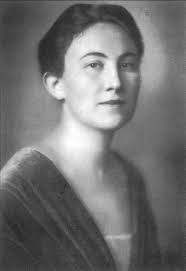 Charlotte Bühler (1893-1975), was a German developmental psychologist who was a founder of humanistic psychology, but whose views on the human life cycle are less well known compared to the theories of Piaget, Freud, and Erikson. She nonetheless made a unique contribution to the study of the life stages with her emphasis on how the trajectory of biological development in human beings has a major impact upon their personality development. In her model, the earlier stages of human development are supported by a burgeoning arc of biological functioning which then begins to level out in the middle stages of life, and ultimately go through a decline in old age (the image here is of an arrow that goes through a trajectory of ascending, leveling, and descending). Here are her five basic stages of biological development:
Charlotte Bühler (1893-1975), was a German developmental psychologist who was a founder of humanistic psychology, but whose views on the human life cycle are less well known compared to the theories of Piaget, Freud, and Erikson. She nonetheless made a unique contribution to the study of the life stages with her emphasis on how the trajectory of biological development in human beings has a major impact upon their personality development. In her model, the earlier stages of human development are supported by a burgeoning arc of biological functioning which then begins to level out in the middle stages of life, and ultimately go through a decline in old age (the image here is of an arrow that goes through a trajectory of ascending, leveling, and descending). Here are her five basic stages of biological development:
- 0-15 years – Progressive growth but no reproduction ability.
- 15-25 years – Progressive growth but with the onset of reproductive ability.
- 25-45 or 50 years – Stationary growth with reproductive ability
- 45/50-65/70 years – Beginning decline with loss of reproductive ability in women
- 65/70 years- Death – Biological decline.
Buhler was the first psychologist to include adolescence and old age as developmental stages of life. She believed that the ”thrust” of the arrow, so to speak, or the motivations that moved human beings along the ”life curve” included the drive for personal satisfaction, adjustment for the purpose of obtaining security, creativity or self-expression, and the need for order.
For more on the life stages and their relationship to different psychological, philosophical, and spiritual traditions, see Thomas Armstrong, The Human Odyssey: Navigating the Twelve Stages of Life
This article was brought to you by Thomas Armstrong, Ph.D. and www.institute4learning.com.
Follow me on Twitter: @Dr_Armstrong



















